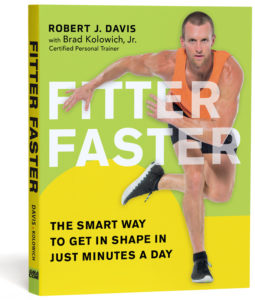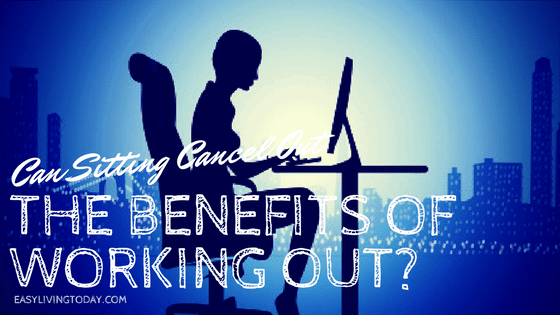Do you have a job that keeps you sitting at your desk all day? Do you commute for long periods of time? Do you get home and just want to lay in bed and watch some TV?
That’s what life is like for most people in America. We drive to work, sit at our desk all day, drive back home and then sit down to wind down after a long day of work.
Hopefully, somewhere in the midst of all of that you are fitting in some exercise!
I’ve been reading a book called “Fitter Faster” by Health Journalist Robert J Davis and Certified Personal Trainer Brad Kolowich, Jr., which discusses this, and I wanted to share it with you all.
Can Sitting Cancel Out the Benefits of Exercise?
By Robert J. Davis, Ph.D.
Author of Fitter Faster: The Smart Way to Get in Shape in Just Minutes a Day
Adapted from Fitter Faster: The Smart Way to Get in Shape in Just Minutes a Day (AMACOM) by Robert J. Davis with Brad Kolowich, Jr. For more information, please visit https://fitterfasterplan.com/
You’ve probably heard the trendy phrase that “sitting is the new smoking.” While it’s an exaggeration to equate the two behaviors—nothing comes close to smoking in its many ruinous and deadly effects on the body—research does show that prolonged sitting may be harmful, even if you exercise regularly.
Pooling results from more than 40 studies, researchers concluded that the more time people spend on their duffs—whether at a desk, on the couch, or in the car—the greater their risk of premature death, cardiovascular disease, cancer, and especially type 2 diabetes.
Regular exercise, particularly higher levels of physical activity, appears to blunt these harmful effects somewhat but may not eliminate them entirely.
An analysis of more than a dozen studies concluded that we need at least 60 minutes a day of moderately intense exercise (such as brisk walking, doubles tennis, or ballroom dancing) to counter the increased risk of premature death due to prolonged sitting.
But another study found that the same amount of exercise – which is more than most physically active people get – doesn’t undo the negative effects of sitting on insulin levels and blood fats known as triglycerides.
The damage from prolonged sitting is thought to be due to reduced muscle activity—especially in the large muscles of the legs and back—which can decrease the body’s ability to regulate blood sugar and remove harmful blood fats.
Sitting for long periods may also adversely affect blood vessel function and increase food cravings, causing us to eat more and gain weight.
To reduce sitting time:
- At work, stand up for a few minutes every half hour, perhaps during phone calls, coffee breaks, or meetings.
- If possible, use a desk that lets you work both standing and seated. Or try one attached to a treadmill that allows you to slowly walk while you work.
- In the car, park as far away as possible from the door so you’ll be able to walk more. Stand if you ride the bus or subway.
- At home, get up regularly from your computer. Try standing and doing chores while watching TV.
Incorporating short bursts of standing and movement like this will keep you from becoming an “active couch potato” – someone who exercises and then remains largely sedentary the rest of the time.
By thinking of fitness as something that entails what you do the entire day – not just the relatively few minutes spent sweating – you’ll be able to fully reap the rewards of your workouts.
Adapted from Fitter Faster: The Smart Way to Get in Shape in Just Minutes a Day (AMACOM) by Robert J. Davis with Brad Kolowich, Jr. For more information, please visit www.fitterfasterplan.com.

About the Author:
Robert J. Davis, Ph.D., is the author of Fitter Faster: The Smart Way to Get in Shape in Just Minutes a Day (AMACOM) with Brad Kolowich, Jr. He is an award-winning health journalist whose work has appeared on CNN, PBS, WebMD, and in The Wall Street Journal. The president of Everwell, he hosts its popular myth-busting “Healthy Skeptic” videos and is the author of two other consumer health books, Coffee Is Good for You and The Healthy Skeptic. A graduate of Princeton University, he holds a master’s degree in public health from Emory and a PhD in health policy from Brandeis University, where he was a Pew Foundation Fellow. Having grown up hating exercise, he today enjoys running, hiking, and working out. For more information, please visit www.fitterfasterplan.com.


